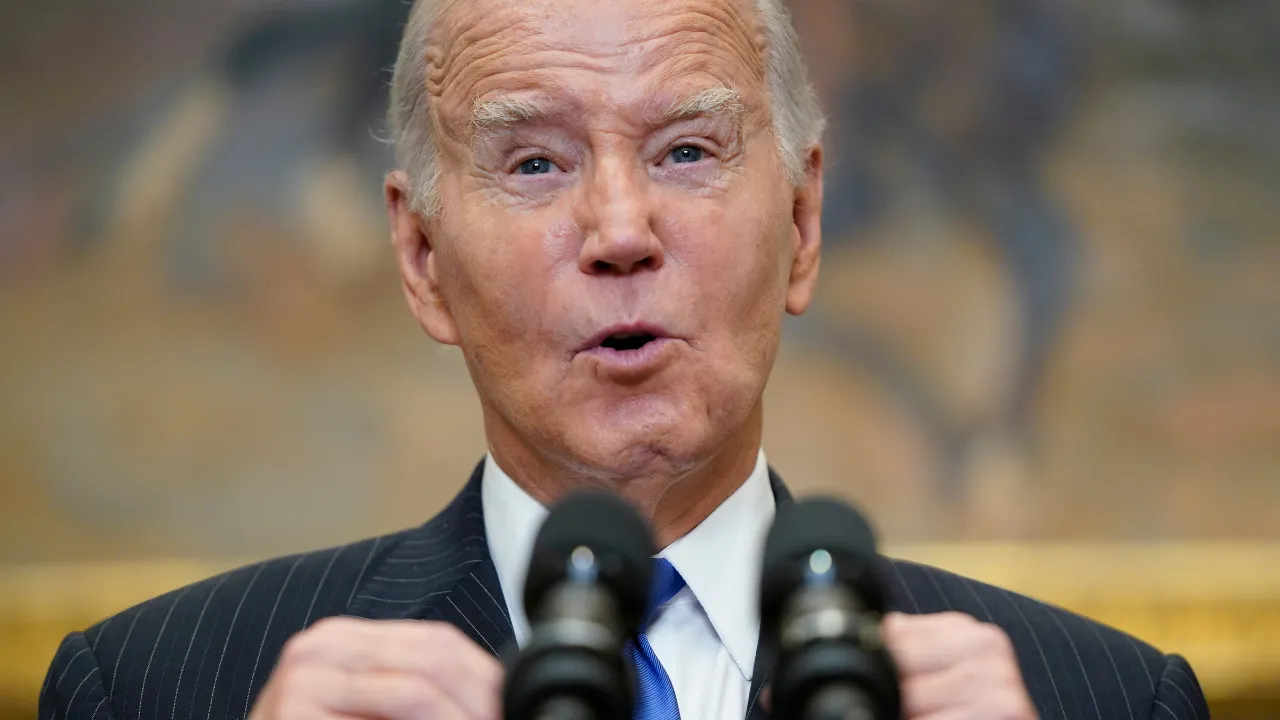Table of Contents
James Fite
Editor-at-Large. James is our wordsmith extraordinaire, a legislation hound and lover of all things self-reliant and free. An author of politics and fiction (often one and the same), he homesteads in the Arkansas wilderness.
The world needs America’s leadership – and it’s crucial to both US and global security that we make sure Israel and Ukraine win their respective wars. That was the message President Joe Biden shared in what was just the second Oval Office address of his presidency on Thursday, October 19. In his prime-time appeal, Biden sought to link the new war between Israel and Hamas with the fight between Russia and Ukraine in hopes of getting a massive aid package, which he plans to send to Congress Friday, approved to fund them both – as well as more that he didn’t mention.
Israel and Ukraine: ‘Vital for America’s National Security’
In a time when public opinion does not favor the president or his handling of either the economy or foreign policy, supplemental funding to aid foreign allies in wars America otherwise isn’t involved in is a big ask. But Biden has an answer. “I know the conflicts can seem far away,” he said during the address, “and it’s natural to ask: Why does this matter to America?”
“You know, history has taught us that when terrorists don’t pay a price for their terror, when dictators don’t pay a price for their aggression, they cause more chaos and death and more destruction,” he continued. Tyranny and terror are two things the American people have always taken personally. From the Revolution through numerous wars in the 20th century and into fighting Islamic terrorists in the 2000s, the best way to convince Americans it’s time to fight is to paint the enemy as either a tyrant or terrorist.
But there’s a downside to that approach, as well. As Liberty Nation Senior Political Analyst Tim Donner recently wrote, “There are few things more unnerving for a president seeking re-election than the outbreak of war.” Have some few presidents come out of war stronger than when the fighting began? Sure – but they’re the exception, not the rule. One of the examples given is, perhaps, more relevant than others. George W Bush’s response to 9/11 was quite popular – and few times in American history has the nation been so unified in a fight. But it didn’t last. As the war droned on, the people grew weary. Why are we still over there, they asked. Some might fear another long-term entanglement in the Middle East – or in Eastern Europe, in the case of Ukraine. And it certainly doesn’t help Biden’s case any to remind people of the fiasco that was his withdrawal from Afghanistan.
As Mr Donner concluded, effective wartime leadership is likely to sustain the popularity of an already popular president. “But if he is already flagging, as Biden is with his favorability barely touching 40 per cent, a war – especially a second one on his watch – is unlikely to salvage his presidency and could in fact cause irreparable harm to his chances of returning to the White House.”
New War, Fresh Outrage?
While polling shows that Biden’s ‘as long as it takes’ approach to Ukraine’s fight against the Russian invasion is falling, the outrage over Hamas’ surprise attack on Israel remains fresh. The president’s strategy of linking the two seems quite clever – and the delivery was impeccable. “Hamas and Putin represent different threats, but they share this in common: They both want to completely annihilate a neighboring democracy,” he said.
Whether this new outrage is strong enough to carry the older war in Ukraine remains to be seen – but it certainly seems like a smart play. And the numbers are telling. Officials familiar with Biden’s proposal report that the grand total will be somewhere in the realm of $105 billion. Of that, Ukraine is expected to get a whopping $60 billion. The remainder is to be split between Israel ($14 billion), strengthening the US-Mexico border ($14 billion), and the Indo-Pacific, including Taiwan ($7 billion). Another $10 billion would go to unspecified humanitarian efforts.
To say President Biden’s concern for Israel isn’t genuine is likely going too far – but the breakdown of his budget request certainly indicates where his priorities lie. Israel gets as much as the US border – a part of the proposal some argue is only there to entice Republicans.
Also of note is the $7 billion to the Indo-Pacific. It’s no secret the US and Pacific allies are all that keep China from swallowing up Taiwan. It does make sense for the administration to try to cut off this potential third war before it begins with a show of force and funding.
Congressional Chaos
Overall, the president’s approach seems well planned. There are potential pitfalls, yes, but he managed to tie the attacks in Israel and the invasion of Ukraine together neatly with the threads of tyranny and terror – and he even pointed out Iran’s support of both Russia and the terror groups currently fighting Israel.
But will that be enough to unify a divided Congress? Senate Democrats say they’re committed to moving quickly on Biden’s proposal. However, conservative Republicans in both chambers oppose sending more money to Ukraine. The continuing resolution to keep the government funded cleared Congress only after such a provision was removed. Biden had asked for $24 billion then; he’s asking for $60 billion now – which is more than what the US has sent over the duration of the war so far.
Then there’s the battle over who gets the gavel in the House. Without either electing a speaker or granting the speaker pro tempore more power, it won’t matter how quickly the Senate passes Biden’s budget request if it can’t be voted on in the House. Democrats hope that a quick passage through the Senate will pressure House Republicans into resolving the speaker issue – but with the clock ticking on government funding, there’s no lack of pressure already. As it stands, it seems those hoping for a quick resolution to the speakership fight and those pushing the president’s funding request can expect the same outcome: disappointment.








